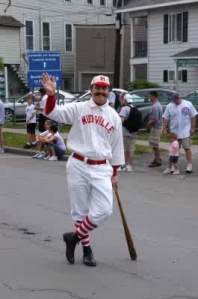On June 3, 1888, Ernest “Phineas” Thayer published the poem “Casey at the Bat: A Ballad of the Republic Sung in the Year 1888.” It was published in the San Francisco Examiner to critical acclaim.
Roughly 2,976 years earlier, in 1088 BC, a young man named Samuel was also using words to reach the audience of his day, the nation of Israel.
As I was reading 1 Samuel 4:1-10 this morning it dawned on me that there are some eery connections between this ancient text about a battle, and the more modern text about a ballad. Unfortunately, they both reveal that big-heads will be big-heads, whether in 1088, 1888, or 2088. Not particularly profound, I know, but if you will indulge me, I will show you what I noticed.
1 Samuel 4:1-10
“1And the word of Samuel came to all Israel.
Now the Israelites went out to fight against the Philistines. The Israelites camped at Ebenezer, and the Philistines at Aphek. 2 The Philistines deployed their forces to meet Israel, and as the battle spread, Israel was defeated by the Philistines, who killed about four thousand of them on the battlefield.
3 When the soldiers returned to camp, the elders of Israel asked, “Why did the LORD bring defeat upon us today before the Philistines? Let us bring the ark of the LORD’s covenant from Shiloh, so that it may go with us and save us from the hand of our enemies.”
So the people sent men to Shiloh, and they brought back the ark of the covenant of the LORD Almighty, who is enthroned between the cherubim. And Eli’s two sons, Hophni and Phinehas, were there with the ark of the covenant of God. 5
When the ark of the LORD’s covenant came into the camp, all Israel raised such a great shout that the ground shook. 6
Hearing the uproar, the Philistines asked, “What’s all this shouting in the Hebrew camp?” When they learned that the ark of the LORD had come into the camp, 7 the Philistines were afraid. “A god has come into the camp,” they said. “We’re in trouble! Nothing like this has happened before. 8Woe to us! Who will deliver us from the hand of these mighty gods? They are the gods who struck the Egyptians with all kinds of plagues in the desert. 9 Be strong, Philistines! Be men, or you will be subject to the Hebrews, as they have been to you. Be men, and fight!”
10 So the Philistines fought, and the Israelites were defeated and every man fled to his tent. The slaughter was very great; Israel lost thirty thousand foot soldiers. 11 The ark of God was captured, and Eli’s two sons, Hophni and Phinehas, died.”
Before we even get into “Casey at the Bat,” we have one connection: the unusual name of Phineas–the son of Eli killed during the Ark battle, and the author of the Baseball ballad.
If you will continue to indulge me, I will show you some others in “Casey at the Bat.” We’ll begin with the 1st stanza:
The outlook wasn’t brilliant for the Mudville Nine that day;
The score stood four to two, with but one inning more to play,
And then when Cooney died at first, and Barrows did the same,
A sickly silence fell upon the patrons of the game
Here is the situation: the fictitious team of Mudville is down 2 runs in the 9th with 2 strikes already against them (yeah yeah, I know the died connection is weak, but stay with me). Continuing on,
-
A straggling few got up to go in deep despair. The rest
Clung to that hope which springs eternal in the human breast;
They thought, if only Casey could get but a whack at that –
We’d put up even money, now, with Casey at the bat.
Now we see the hope that the Mudville fans hold onto: though they are in deep despair over their odds of winning this game, they know “if only” their mighty player Casey would just get to bat, they would win.
(We’ll skip down a bit to the part where Casey, miraculously, is up to bat).
-
Then from 5,000 throats and more there rose a lusty yell;
It rumbled through the valley, it rattled in the dell;
It knocked upon the mountain and recoiled upon the flat,
For Casey, mighty Casey, was advancing to the bat.
This should sound familiar right?
“When the ark of the LORD’s covenant came into the camp, all Israel raised such a great shout that the ground shook.” 1 Samuel 4:5
For the next several stanzas, Phineas is going to describe to us the haughty manner in which the Mudville’s champion Casey approaches this potentially crisis-turning moment. I will give you some of the highlights:
“ease in his manner” , “pride in his bearing” , “defiance gleamed in his eye” , “a sneer curled his lip” , “stood…in haughty grandeur” , “scornful look“
Over the course of seven stanzas, we discover that Casey is arrogant, puffed up on his own strength and talents. And with the casting of the final ball, his pride will have its fall.
-
Oh, somewhere in this favored land the sun is shining bright;
The band is playing somewhere, and somewhere hearts are light,
And somewhere men are laughing, and somewhere children shout;
But there is no joy in Mudville — mighty Casey has struck out.
There may be “laughing somewhere,” but it wasn’t in the city of Mudville, and it certainly wasn’t in the nation of Israel after the day of battle. We are told in 1 Samuel 4:13 that “When the man entered the town and told what had happened, the whole town sent up a cry.“
Pride in the nation of Israel (particularly its leaders), and pride in the heart of Casey, resulted in sorrow for the people. They took the good things that God had given them (talents, a visible sign of His presence, and a promise that He would be with them) for granted. They ignored opportunities to humble themselves until it was too late to prevent calamity.
It only takes two letters to describe big-headedness in our day.
BP.
**
If you liked (or disliked) this strange post connecting big-headedness, baseball, and biblical battles, please say so in the comments. I’m always trying to improve the site, and tying history together definitely interests me. If there is anyone else out there who finds it equally interesting, pipe up and say so. Thanks!
**
And as always, I like to give credit to the places that made this post possible.
“Casey at the Bat” – Wikipedia article
“On this Day” – Wikipedia Main Page


